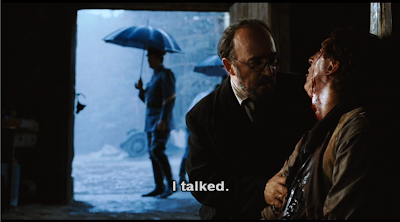Today I’m starting a new column on Things That Don’t Suck. It’s one I’ve wanted to do for a long time, at least since the piece I did in the same format on
The Prestige. Sometimes when we’re watching a movie, regardless of the greatness or lack there of as the film as a whole. It’s a single scene that rattles around in the mind.
A quick note about what Scenes ISN’T. It’s not going to be a shot by shot look at the scene. Though I have no doubt that some entries will demand just that. Nor is it going to be the kind of purely visual essay that you find done so well at Moon In The Gutter or Shock Of Glimpsing.
Instead Scenes is going to be about looking closer. I truly do believe that a lot of what makes a film work is intangible. Scenes is about what happens when I’m in the opposite mood. It is simply a closer look.
Needless to say, there will be spoilers.
The scene in Pan's Labyrinth needs a little bit of setting up. A few scenes before the one I want to discuss, the runt of the Spanish resistance fighters has been captured by Captain Vidal and now lays at his mercy. We know, though the captain doesn't that the boy has the power to not merely compromise the Spanish resistance forces, but several of his own staff as well, including his head of household, and doctor.


By the time we reach the end of the scene, capped off when the Captain offers the stuttering boy his freedom if he can count to three without stammering, perhaps the most sadistic thing in Del Toro's oeuvre, it is clear to us that the Captain is a genuine monster.
A few scenes pass, following our lead Olivia, allowing plenty of dread to build off camera before we return to that dusty barn. This time with the doctor himself in tow.
It's classic tension building stuff. Has the man talked? Has the doctor been compromised?
There's still no sure answer.
But note the graceful juxtaposition between his toolbox and Vidal's.
We get our first full look at the damage done by Vidal.
While Vidal himself discovers the Doctor's true loyalties. The Doctor didn't walk into a deathtrap but he's in one now.
Crucially, the doctor does not see Vidal discover the clue. His act of courage here is not that of a desperate man with no way out, but one who believes he COULD still walk away unscathed. If he so chose.
Until this happens. Even if Vidal wasn't suspicous it's doubtful the Doctor could have gotten away with walking out of the building with a shrug and a "Woopsy daisy your crucial informant died." To put the man out of his misery he must doom himself, and he knows it.

Rack Focus...
Matched To Rack Focus...
The Doctor hesitates...
Then Does what he must.

The Captain returns after spreading his monstrosity to the fantasy world, burning the mandrake root in one of the film's most disturbing images. In short order he discovers the treachery, and poses the question.


After the doctor's answer The Captain retorts that The Doctor "Could have obeyed him." To which the doctor replies "That only people like the Captain can do that."
That's optimistic to the point of being a lie. Just ask the country of Germany circa 1938, or the soldier's headed to My Lai, or stationed at Abu Ghraib. If history has documented one thing rather conclusively, it is that ordinary people will do horrific things with remarkably little compunction.
Yet here he is, this small fastidious little man, not the dashing rebel leader, not the chosen one, who has the courage to do what he knows he must. Knowing there is no hope of escape, knowing the cost he must pay. Brave enough to do it anyway.
And pay for it he does.
In explaining the film Del Toro quoted Kierkegaard when he said "The Reign of the Tyrant ends in death. The Reign of the Martyr begins in it." The Doctor is vindicated, not merely in the death of the tyrant, but in the righteousness of the act itself.
In a film full of mythical power, this is one that falls straight in the realm of the physical. And yet there has not been a scene I've watched before or since, has made me question my own morality and courage quite so much.




























































































































6 comments:
Really good stuff. I agree with your comment about the scene causing the viewer to question their own morality and courage. I think this film is overdue a rewatch.
One powerful scene in an extraordinary film, Bryce. Wonderful commentary, too. Great post (and new column). Thanks for this.
I'm excited to see this new column grow. I've been discussing this with my roommate how even the smallest scenes can say so much about the movie as a whole.
Amen to everything these guys have said. This is a brilliant idea for a new column, Bryce, and you've picked a hell of a film - and an astoundingly realised scene - to kick things off with.
My favorite scene in the movie, the composition and acting and everything. Great commentary.
@ Duckers: Many thanks Duckers. Nice to know I'm not the only one this resonated with.
@ le0pard13: As always le0pard you're too kind. Thanks a million.
@ TDM: You're reeeeaaaallllyyyyy going to like what I have planned for Column #3.
@ Neil: Thank's Neil, I have to give you partial credit on this, it was your praise on my Prestige Article that made me want to use the format again.
@Simon: Thanks again Simon. It's nice that both you and Ducker's responded to this scene before hand. Always good to know I'm not the only one.
Post a Comment